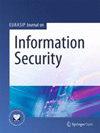量子安全多变量多项式公钥封装算法的性能比较
IF 2.5
Q2 COMPUTER SCIENCE, INFORMATION SYSTEMS
引用次数: 0
摘要
最近,Kuang、Perepechaenko 和 Barbeau 提出了一种新型量子安全密钥封装算法,称为多变量多项式公钥(MPPK)。MPPK 密钥封装机制的安全性并不依赖于质因数分解或离散对数问题。它建立在模块化 Diophantine 方程问题的 NP 完备性基础上,对于这个问题,目前还没有已知的高效经典或量子算法。因此,它可以抵御已知的量子计算攻击。MPPK 的私钥由一对多变量多项式组成。在另一篇论文中,我们分析了当这些多项式是二次多项式时 MPPK 的性能。该分析强调了 MPPK 的高解封装时间。我们发现,在保持安全强度的同时,多项式可以是线性的。在解封装过程中,可以获得相当大的性能提升。在本文中,我们将对线性情况进行基准测试,并将结果与之前的二次情况进行比较。本文章由计算机程序翻译,如有差异,请以英文原文为准。
Performance comparison of quantum-safe multivariate polynomial public key encapsulation algorithm
A novel quantum-safe key encapsulation algorithm, called Multivariate Polynomial Public Key (MPPK), was recently proposed by Kuang, Perepechaenko, and Barbeau. Security of the MPPK key encapsulation mechanism does not rely on the prime factorization or discrete logarithm problems. It builds upon the NP-completeness of the modular Diophantine equation problem, for which there are no known efficient classical or quantum algorithms. Hence, it is resistant to known quantum computing attacks. The private key of MPPK comprises a pair of multivariate polynomials. In a companion paper, we analyzed the performance of MPPK when these polynomials are quadratic. The analysis highlighted the MPPK high decapsulation time. We found that, while maintaining the security strength, the polynomials can be linear. Considerable performance gains are obtained for the decapsulation process. In this article, we benchmark the linear case and compare the results with the previous quadratic case.
求助全文
通过发布文献求助,成功后即可免费获取论文全文。
去求助
来源期刊

EURASIP Journal on Information Security
COMPUTER SCIENCE, INFORMATION SYSTEMS-
CiteScore
8.80
自引率
0.00%
发文量
6
审稿时长
13 weeks
期刊介绍:
The overall goal of the EURASIP Journal on Information Security, sponsored by the European Association for Signal Processing (EURASIP), is to bring together researchers and practitioners dealing with the general field of information security, with a particular emphasis on the use of signal processing tools in adversarial environments. As such, it addresses all works whereby security is achieved through a combination of techniques from cryptography, computer security, machine learning and multimedia signal processing. Application domains lie, for example, in secure storage, retrieval and tracking of multimedia data, secure outsourcing of computations, forgery detection of multimedia data, or secure use of biometrics. The journal also welcomes survey papers that give the reader a gentle introduction to one of the topics covered as well as papers that report large-scale experimental evaluations of existing techniques. Pure cryptographic papers are outside the scope of the journal. Topics relevant to the journal include, but are not limited to: • Multimedia security primitives (such digital watermarking, perceptual hashing, multimedia authentictaion) • Steganography and Steganalysis • Fingerprinting and traitor tracing • Joint signal processing and encryption, signal processing in the encrypted domain, applied cryptography • Biometrics (fusion, multimodal biometrics, protocols, security issues) • Digital forensics • Multimedia signal processing approaches tailored towards adversarial environments • Machine learning in adversarial environments • Digital Rights Management • Network security (such as physical layer security, intrusion detection) • Hardware security, Physical Unclonable Functions • Privacy-Enhancing Technologies for multimedia data • Private data analysis, security in outsourced computations, cloud privacy
 求助内容:
求助内容: 应助结果提醒方式:
应助结果提醒方式:


